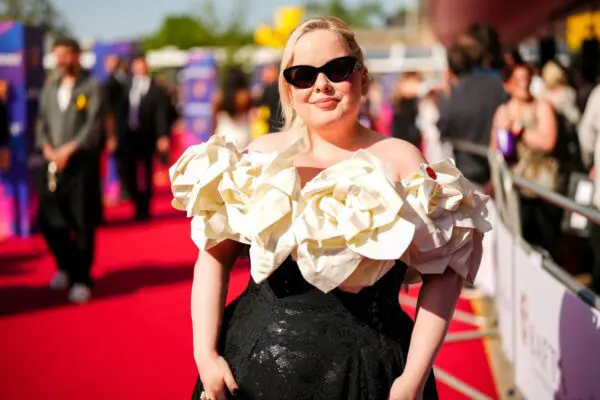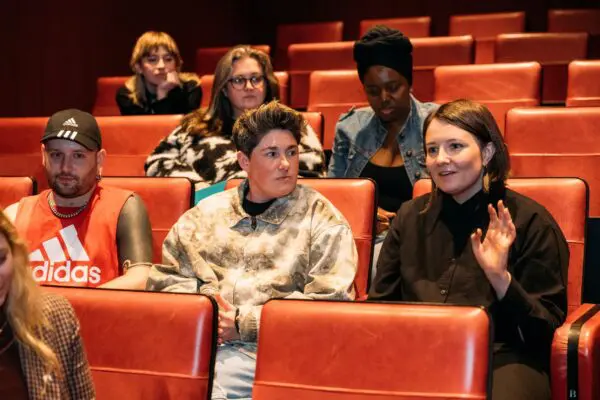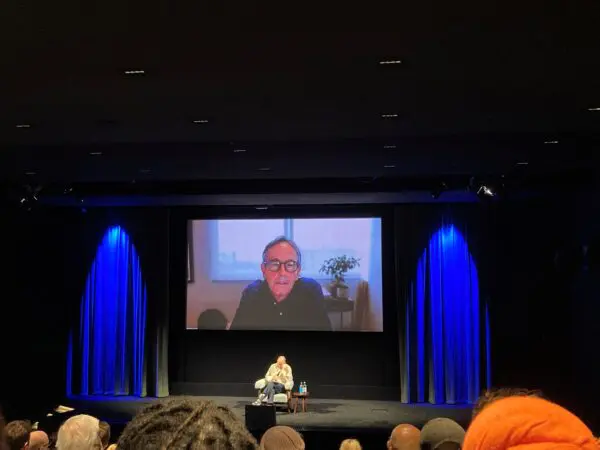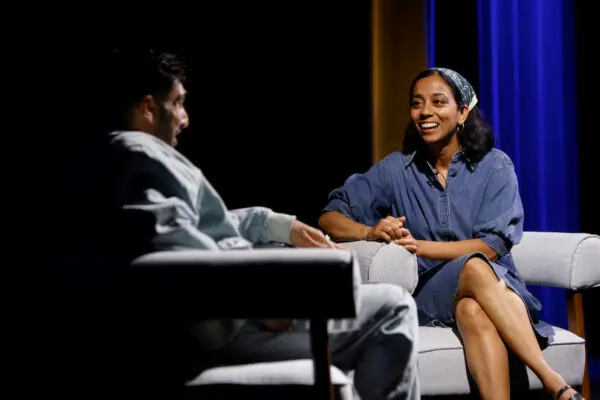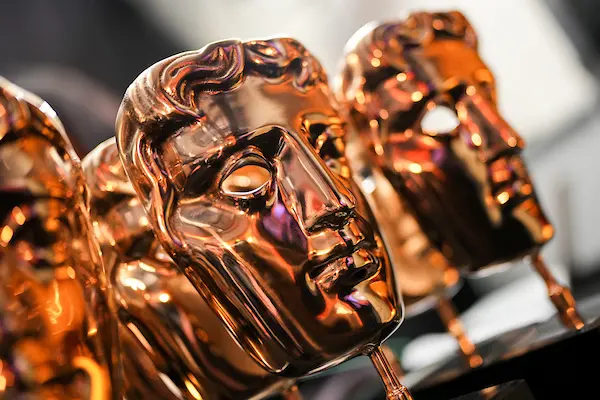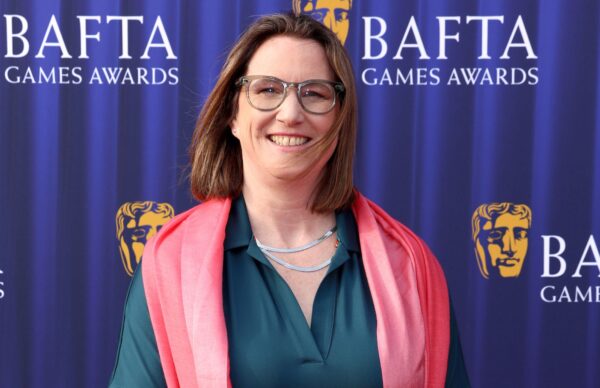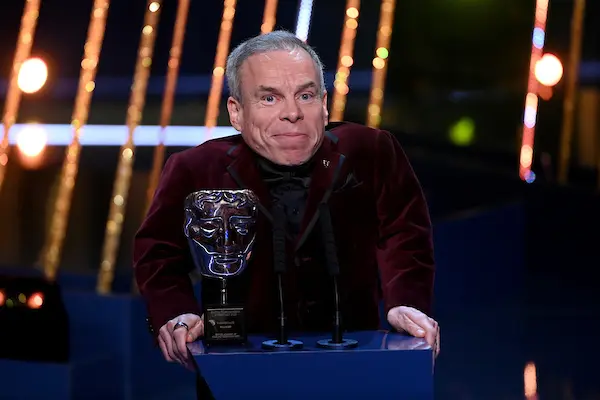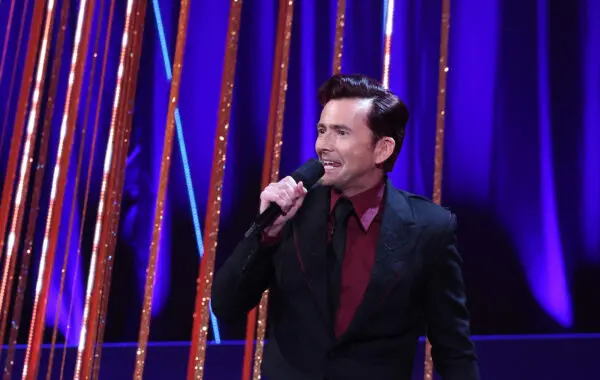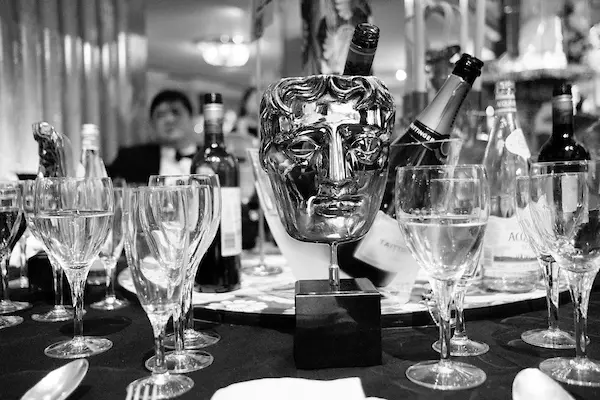Akua Gyamfi: Hello, good evening and my name is Akua Gyamfi and welcome to the BAFTA Film Sessions for Leading Actress. This virtual series celebrates the nominees from this year’s EE British Academy Film Awards. Here’s some housekeeping before we begin. Join the conversation on social media using the hash tag EE BAFTAs. If you have a question please use the Q&A function, if you’re joining us on Zoom, and if you’re joining us via Facebook or YouTube please put your question in the chat. Closed captioning is available now which you can turn on at the bottom of the screen via the cc button.
So it’s my absolute honour and pleasure to introduce our wonderful EE BAFTA Leading Actress nominees. First of all Alfre Woodard who stars in Clemency, Bukky Bakray who stars in Rocks, Radha Blank from The Forty Year Old Version, Vanessa Kirby for Pieces of A Woman and finally but not least Wunmi Mosaku who stars in His House. Hi everybody.
Just one thing before I start. If you’d like to follow a live transcript in a separate window, please click here. I think there’s a button that will let you know where to click. Don’t forget to put your questions in the Q&A section and I’ll come to you as soon as possible.
First of all ladies, congratulations on your nominations. As we get near to the big day, how are you all feeling? Alfre?
Alfre Woodard: Oh my. On the big day what I realised is I need support, I need tech support. I’m a bit of a Luddite. I just want the freedom to really be with you guys. I’m so excited, my eyes are travelling around this tablet because I want to see y’alls faces, y’alls beautiful, brilliant faces. I’m excited to meet y’all.
AG: Thank you! We’re excited to meet you too. Radha, how are you feeling in this run up? It’s a lot of pressure isn’t it right? You’ve got to do a lot of conversations, talk about yourself a lot. What’s that like?
Radha Blank: I mean I’m actually if I’m being honest I’m used to talking at least for the past year about my work as a director on the film so this is a new conversation and I’m a little in awe and star struck by my co-nominees, each and every one of them have done something I thought was amazing. I’m in a Zoom with Alfre Woodard and it’s just now hitting me that someone who I have admired for so many years as a storyteller is sharing space with this woman and these other amazing artists who just so happen to be women. So yeah, I’m just happy to be here. Again, I said this the other day when we were talking, for me being nominated is not so much about my particular performance but the journey of the movie that we’ve made it this far. I get very emotional when I think about how far we’ve come. I’m very, very honoured to be here.
AG: We’re honoured to have you. Vanessa how are you feeling in this moment?
Vanssea Kirby: Just so grateful. To be with you all and also I think for all of us to have films that came out this year, and ones you can tell just have so much love in them, and that against the odds managed to be out and be seen is mind-blowing. You know with our films, I’m sure you guys all feel this, when you’re making them you’re like oh I’m sure three people will see this, my mum… You know you never expect them to even have a thought of having gone out in this particular year. I feel immensely grateful for that. Everybody is so cool, I’m so honoured.
AG: Wunmi this is a big, huge feature and like Vanessa said not expecting so many people to watch it but they have and you’re nominated. How does it feel for you in this moment?
Wunmi Mosaku: Just like Radha said I’m kind of star struck, and it’s just kind of hitting me right now, we’re all here together. I wasn’t expecting this at all, I mean you don’t really think first of all an independent film, a horror film, will get this kind of recognition. It’s quite extraordinary and I’m just I’m so chuffed. I just can’t believe it actually, I just can’t believe it right now.
AG: Bukky now I’m going to baby you and patronise you. As the baby of the group, you’re new to this in very different ways but this is a huge category to be in. No pressure, but can you quantify it for a newcomer like you?
Bukky Bakray: I feel really humbled to be in this space with these spectacular women. Just to echo what everyone’s said it’s a really weird feeling I’ve never really felt this before. She definitely won’t remember, but Alfre did a talk at RADA and yeah she planted this seed in my head.
AW: You!
BB: Yeah I can’t believe you actually remember.
AW: Girl, oh my God.
BB: I don’t want to like get out of my body right now but yeah, so that is just really, it’s just really surreal to be in a space with these women, even remotely I can feel the energy, I can feel the vibrations, the transparency, love and encouragement and I can feel how pivotal we are in the industry. I feel so blessed and grateful to be part of this ensemble. Coming together like this really puts stuff in perspective for me. I don’t know how I’m going to react when I click off the Zoom but it’s going to be crazy.
AW: Can I just say something?
AG: Of course, of course.
AW: You know, girl that was you! That was you on screen. I’m gonna weep now. You are all that. You were all that when I met you, I had no idea that was you on screen. That’s what you were able to do and transform into. I’m not minimising it at all, BAFTA has all the weight and history that it has, but all of us are supposed to be in this space now together. Fran is supposed to be here with us, and this is where we’re supposed to be. There’s no place we’re not supposed to be especially with what we’re bringing and the healing we’re bringing to the world with our stories Radha and Vanessa and Wunmi so the next step is somebody with some creative intelligence needs to put all of us on screen together, that’s all I’ve got to say.
AG: Thank you. And I must, I did forget in my intro, unfortunately Frances McDormand who’s also nominated for her performance in Nomadland isn’t able to join us, she sends her love and well wishes. This is an amazing situation on so many levels. Bukky I’m going to blame you because I said last time we spoke at the weekend stop making us cry! We’ve got to keep it together. Or we don’t have to keep it together; this is friends, family and everyone watching get with the spirit because this is a love room right now.
I wanted to say all your projects are so varied but what they have in common is the world through the eyes of a woman and a girl and that it’s resonated in such a big way. The fact you’re all nominated, it’s the fact the stories are so powerful, you’re not secondary to a man’s tale, they’re all strong women narratives, I mean it seems so basic to ask but what was it with your scripts that jumped out at you that made you think this is the story I want to say yes to, in whatever capacity it came to you, what was it that really jumped out at you? I’ll start with Vanessa.
VK: I’m so moved, oh my God. Also, as you just said maybe there’s a world all five of us can do something together and I thought do you know what maybe the day is dawning where they might actually finance five women leading a film, you know? And I think that’s honestly what I felt when I first read Pieces of a Woman, I couldn’t believe a quarter of the screen time was just a woman giving birth, simply a woman giving birth, and the rest of it the everyday struggle of overcoming the loss of a baby in the way she experiences. Honestly a few years ago I know it wouldn’t have been financed because the people making the decisions would have said well it won’t sell and people wouldn’t want to see that. To me it’s even more essential, we deserve to see all our experiences reflected on screen in all different ways. As women I believe there’s a real runway to start taking those stories and putting them on screen and having this amazing responsibility to show all the different ways it is to be female that haven’t been explored enough I think on screen. It was mainly that, I thought it was such a cool opportunity to be one part of something that maybe hasn’t quite been put on screen before in its entirety. For all the women I spent time with that had lost babies, it just felt so important for them. That made it so much more than about me or any one person it made it a bigger purpose somehow.
AG: Wunmi, how did real jump out of a horror? Because it’s a horror, you scared me, but yet… It’s a strong powerful narrative, what was it in the script that took you past the fear?
WM: You know it was interesting because reading the script I really wasn’t sure if this house was haunted. The way it read it was like this could all be in their heads, it could just be metaphorical and I’ve, I kept on saying to Remi but is it real though, is this just in their imagination or is it real? And he was saying well Wunmi it’s real because we’re making a horror film… But yeah, I was so challenged by the script; it challenged my ideas of right and wrong, good and bad, relationships and how to get through the darkest sides of a relationship. I really feel like those two were clinging to like crumbling rocks and climbing this huge mountain and they’re individual and together, and I just really… I just thought it was so clever. When we talk about refugees, when we talk about asylum- seekers, in the UK we talk about migrants. I’m like these people are fleeing from something, no one just wants to leave home just for leaving home’s sake. These guys are fleeing for safety, for the chance to live their lives as fully and wholly as they deserve.
I thought I was open and cared and was looking with an open loving heart to the plight of a refugee, but I hadn’t actually humanised the story myself and seeing that when you come to a new land to find a new home even just the barriers of like being a refugee you don’t have, you don’t have money you don’t have ID, you don’t even have ID do you know what I mean? I thought wow, I thought I cared but I’m still talking in huge sweeping statements and ideas and I’ve not humanised what they’ve actually gone through and I’m not seeing the scars and wounds and the weight they’re carrying around with them. And I thought I cared and when I read the script I cared more, learned more and saw it differently. That’s all when reading a script what matters to me. Am I changed? Yeah, I really see why all of us are here because our films do that, they challenge and make you think a little different, just a little different. Open you up a bit more.
AG: Bukky, the process in casting you was a bit different to the usual you know going for an audition. Had you seen the script? At which point did you see the script and what did you see about Rocks in that script that resonated with you? Did you see the script during the rehearsal, research process?
BB: So when we first started the workshopping process it was just us girls going to different parts of London and submerging other girls in London. It was that that really made me really want to be a part of this process. It felt freeing to be able to go somewhere and do something with this group of people. I didn’t really feel bound, even if the locations weren’t exciting, even if it was a warehouse in the middle of north London, it was experiencing something so different to my everyday life. I was so ready for that, drawn to it so much. It really excited me the idea of doing something or being something that was such a juxtaposition to my everyday life. We actually saw the story blocks in the middle of the workshopping process, so the writers put the beats of the story onto these post it notes and they blocked it out and that’s when we first, when we all first heard the story. I remember just thinking this is such a mundane story because that’s what it is, so throughout the story I won’t lie to you guys I wasn’t really focused on the story I was more so focused on the people I was going to be telling the story with and then as I stepped on set and started performing, that’s when I started to look at the story in a very respective way and I just realised this was somebody’s reality and that kind of process really made me feel I am the narrator, not the narrator, the main character in my own story and everyone is the main character. Jumping and being someone else was a very weird and enlightening experience.
AG: Thank you. And Radha, you’re the creator of your world so it’s a different process again because you didn’t see the script for the first time, you are the script, and you wrote the script. So I guess what was important as you were writing the script and building it, what was important for you to get across so we could relate and like I said you are my home girl now because I relate so much, what was it you felt you needed to pull out in the script to make it relatable?
RB: If I’m being completely honest this was also part of my personal healing work. Call it exorcism or catharsis I just had this thing I had to say. What started to create both a pressure and a deep desire to get it right was a couple of things: My own family’s artwork, my mother’s image, her painting, my brother, the family name. I really wanted it to feel authentic to our legacy in New York as artists. It’s a send up so it’s not 100% my life but it’s a good portion and so I just wanted it, I wanted my parents, not that I will ever know this, but I feel in my heart I wanted them to feel honoured and I wanted black artists to feel seen and so where that was affirmed is when I would do readings with other actors, some professional and some my friends, and they said they could relate to it. I do think the story you know, people are—there’s a different entry point for different people for different reasons. I just wanted to make sure somebody could see, and some of it could resonate with another person and that the people I was talking about, black women, New Yorkers, artists of a certain age could resonate with it and felt seen. Then there’s another thing: I really think it’s important to not give energy to people who approach your work negatively or with scepticism or with a scrutiny that is not about anything healthy but I was kind of propelled by people, someone even on Twitter—again I know I should stay off of there y’all, I know I should stay off of there—but someone on Twitter the other day, someone who actually looks like me, said they didn’t buy it that a woman of my age and my size would have a young man pursuing her and I picked up my phone and I said really? Do you want me to go through my contacts right now girl? I did have something to prove that a woman my age is still desirable, we still get down, sometimes we like them young and don’t need to be ashamed about it. That became another engine, speaking for that woman—I said this the other day, there was a moment where it was like oh God can we just lose thirty pounds before shooting and then there was another part of me like no you can’t because even with that extra thirty, forty pounds you’re still desirable. I’m not the Lizzo of filmmaking, I’m not anybody’s body positivity whatever, this is where I am right now, but I knew making the film with the body that I have in that moment as opposed to being fifty pounds lighter would actually mean something. At that point it went beyond the script or black and white aesthetic. It was about being on the screen and affirming that we too are desirable and we get down. Sorry Miss Alfre to take it there.
AW: You’re apologising to me?
RB: People online are like I don’t buy it and I’m like OK!
AW: I won’t get them fired up today because you know the truth. Mean something, do something all those years, and we’ve been doing all those years.
RB: And I saw Juanita too, so I already know. You know what I’m talking about.
AW: My husband, who is six years younger than I am, wrote that for me.
AG: There you go! Coming to you Alfre, because I associate you with a freedom and lightness that in Clemency your character was quite closed and still, pushed down her emotions. What was it about Bernadine on script that was like this is the woman I’d like to bring to life, I’d love to bring her to life.
AW: I always like to do something I either don’t know how to do or haven’t done. First of all, we all know it is so hard to go there, to do the work, to go there and you’re all dressed and everyone’s there. You really shouldn’t go there unless you feel—I always feel like there’s something I can think of that maybe someone else won’t think of. I’d much rather see a good actor doing her work than go to work because it’s just complicated. That was one where I thought oh I’ve been doing things sort of outside physically moving along, I was doing something that I actually just finished in the wilderness, falling down in the forest and running around in a post-apocalyptic thing and I said ah OK I want to—she’s a committed person, not only to her work but to the larger community, especially social justice. To cut the story short, it was to work with her and to tell a story that in the states—you guys don’t deal with state-sponsored execution the way we do in the states—and I can remember from the time I was a little girl in Oklahoma, every time they were putting someone to death it made me sick as a child and your parents have to kind of talk you through it. I’ve always been that side of the fence where you’re holding a vigil trying to stop an execution, but I’ve never thought, and this is why Chinonye [Chukwu, director of Clemency] came to this story, about who we charge with ritualised murder. She took me on a prison, to tour prisons in Ohio and I met probably five women who were wardens, a director of corrections, all these people who do this and they had a higher PTSD rate than people who do multiple tours and battles in Kabul or around the world. We don’t know their story. It’s the same with a lot of things, we charge people to do things, and when I say charge them we’re paying taxes if you’re a citizen then you’re not doing anything to counteract or stand up, it’s a stain, it’s deeper than a stain on the soul of society. I wanted that story to be out. When I met the women wardens it was like what little girl says ooh what do I want to do, I want to be a death row warden when I grow up? Is that little girl down at the creek pulling legs off of frogs? And I found out, which is another reason to be an actor, you have to keep learning till you drop, you learn even till you’re ninety. I learned those people usually come out of mental health administration, they come out of social work, they’re the kind of sisters that would be in your book club or church or temple and of the eight women who are wardens even in maximum men’s security prisons in Ohio, the state we visited for this, five of them are sisters and three of them are Caucasian sisters. I just found out what it feels like to do that and the kind of person. It doesn’t take a person who relishes it, it takes a person who wants to create dignity and order in the midst of something that we as a society are charged to change, not them. If it’s going to happen you’ve got to have somebody that can walk those people all the way through it.
AG:I understand and I actually it was, you humanising your character that made me look at those roles differently as well. Often, especially when they’re of colour we can side eye them as traitors for being in that role and can forget sometimes that it’s a secure job in some cases, that’s the base that it’s a secure job and forget about the other stuff that goes with it, the PTSD and everything. Thank you.
So Rocks—Bukky, why am I calling you Rocks—Bukky, I’ve said many times that Rocks, the reason Rocks is so special is that it’s one of very few if not the only film that captures inner city London through the eyes of a young girl, a black girl, I don’t think we’ve even got a British made film coming from a black girl’s perspective at all that I can think of. When I watched it I saw myself, I saw my friends, I watched with my daughter and she saw herself, saw her friends, what experiences did you draw from when building Rocks’ personality? What did you learn about yourself post-bringing Rocks to life? What did Rocks teach you?
BB: It taught me that I am emotionally unavailable. Throughout my three plus, four plus years of secondary school or high school, my partner, the person I sat next to, my classmates, I knew Rocks and Rocks came to school every day and acted like everything was cool. I saw Emmanuel, Roshe, Sumaya, I saw these girls every single day and they all came to school and they all acted like they were perfect and everything was fine. One approach with the character and trying to do all the work that goes into approaching these characters, I realised I was so close to this person, I knew this person, so I suppose to me trying to create a new character, new attributes, I just drew from what I already knew, people I already knew and I just heightened pieces of myself. I feel like everyone in the world has a Rocks in them because we all share those deep-rooted connections, all know how it feels to experience life and we all understand it to some degree. I do know Rocks is an individual in her experience, but the one thing I do identify with her is not her skin tone because I believe skin tone is an overrated virtue, but it’s her experience and how she sees the world and how the world sees her. That’s one thing I identify with. I know all of us women on this panel right now, I know the one thing we do share, the vivid similarity is that we’re all women but if you were to write down all our stories on a piece of paper the differences would outweigh the similarities by far. That’s one thing I clocked with Rocks was I identify with her so much, but her experience is so different to mine. The way she reacts to things, that’s not what I would do. When Sarah Gavron the director, when something happened to Rocks she told me scream into a pillow and I said why am I screaming into a pillow, that’s not something I would do? But then I didn’t understand that’s something maybe Rocks would do in the circumstance she’s in. Everyone experiences life, something’s happened to so many people, to all of us sad things have happened but the way we react to it is so different. Because we filmed in chronological order it was like I was waking up every day to live this separate life. As it went past I started to feel things I wouldn’t usually feel, when I filmed this relationship with this young boy, when I made this relationship with these new beautiful sisters and these things that were happening to Rocks, before the director even said action or she didn’t say action because it was a different kind of experience, but before we even started filming I felt that in me because it was ready to come out. That’s why the experience was such a beautiful way to make a film because it was; it was almost like everyone made the conscious decision to live this separate life for these seven weeks of shooting. Every time I went home I went back to Bukky and every time I went to set I was Rocks.
You asked me what did it reveal about myself: It made me appreciate humanity a lot more because when I live life, I wake up every day, try to do my thing. I don’t really think about life or humanity or my experience, but I think I said before jumping into someone else’s body made me realise the nuances of my own and that made me realise maybe there’s some things I should do differently. It made me be much more mindful. Just to land on this I used to like to take the bus, I used to take the bus a lot because I could just stare at people from the window and I remember looking at people’s faces and some people looked really sad and some people looked really happy. Some people just had different looks on their faces and I remember thinking they’re going to go home to something and what they’re going to go home to might be good, might be bad and it made me really upset knowing that everyone’s going to go home to this whole big narrative that has so many collisions just as Rocks’ one has and it just made me think about the human condition as a tragedy because it’s upsetting, but it made me start to be more mindful about the people around me and realise people are experiencing life just like I am.
AG: Bukky you do it to me every time. Vanessa, everyone hones in on the birthing scene in Pieces of A Woman and it is such an important scene. I know you spoke to women who had experienced child loss, that must have been heavy to deal with. I wanted to know, is that the scene that sits with you the most? What has Martha, playing Martha taught you about yourself? But what is the scene that stays with you from Pieces of a Woman?
VK: Erm I mean ultimately it is of course the birth and there are two reasons for that. Firstly I knew nothing about labour at all about motherhood, birth, pregnancy. I was pretty clueless really and in having to research it because I was so scared to get a second of it wrong because I knew it was going to be an uncut take up to forty-five minutes depending on what happened, I thought if I get a second where my acting is a bit dodgy or I don’t know what I’m doing, then half the population can call me out straight away. So I sort of, I got to watch someone give birth for real and that was so extraordinary and blew my mind, nothing in any documentaries had given me any better idea how to act it. Watching this woman be her full primal animal was just so amazing and beautiful and of course messy and difficult and scary sometimes and so getting to do that with no interruption as an actor, getting to just be like I’ve got to let my body do this, I’m in this room now but I’ve got to close that off. In scenes for me you’ll get half way though and go ooh that went a bit wrong and in and out and it’s so annoying as an actor to have that and it’s so rare to be present fully through a full scene and someone whispering on the side and you can hear them through the mic. But this was like OK we potentially have forty minutes and we’re not going to interrupt you and you can just go, you know. Even though that was scary cognitively, as soon as action was called you were just there and you had no choice but to go into it. The presence, I think, that everyone had including the amazing DoP who was like a dance partner, everyone was like dancing on this dance floor we had. We roughly planned out, we only filmed it on an iPhone once the day before and roughly planned out we’ll be in the kitchen for a bit, then the sofa then the bath then the bed. We don’t know when the contractions are going to come we’re just going to hope for the best. Then we did four takes the first day then two the second and truthfully it was the best, best, best work experience of my life. I think I would have been really bad if Cornel the director hadn’t had the courage and trust actually of actors, which is just such a gift, to go you know what? Even if you mess it up you’re just going to go for it, rather than going we’re going to cut this we’re going to film in the bath, come to a close up, ok break everyone and you go to lunch and you come back and are really tired and you’re like ah OK get in a bath with a prosthetic you know. But it was such a beautiful gesture to go OK I trust you guys, this is roughly the shape and let’s see what we get. Doing the four takes on the first day and having to shake it off, start again, it was beautiful. That will always stay with me because I think God I wonder if I’ll ever get the opportunity to do an unbroken take like that for forty minutes and just play and let it be, and actually to have faith because obviously I was so scared to get it wrong because I was like obviously if I get it wrong the whole movie doesn’t work and I really wanted to get it right. I didn’t want to show a birth that was restrained or polite or pleasant, I just wanted to let it be what I saw which was so beautiful in its messiness and with blood and nausea and all that kind of stuff. What was your other question?
AG: The lasting effect on who you are from being Martha?
VK: Oh yes. I had a really long conversation today with someone I love who had lost a baby, we talked this morning actually and she asked me that same question. Do you know what, I didn’t know at the time, I knew I cared so much about their stories because there’s such a silence around it as I’ve said, but do you know what I’ve noticed that whole experience do is I have a much greater sensitivity to anyone going through something hard. It makes me think what was I like before? I hope I had as much compassion as I could have had up to a point, but imagining living through something that horrendous. I also realise through playing someone who was so internal with her grief that it might look like someone’s fine but they really might not be and we might take it as them seeming OK and they might be going through the worst thing ever. So I guess just grief generally, I have a whole load more empathy and sensitivity and compassion. I really like that, I’m so grateful for that. I sort of know more how to be there for someone that’s going through something difficult. Of course even though I didn’t ever go through that loss myself I’m grateful for the experience of several intense months of feeling those feelings and living through that. It’s funny as actors because we go through it, do it, but we don’t. Sometimes I feel like a bit of a fraud but I tried to understand as best I could. All those things I guess, that’s why I said with all your movies guys you can feel the love in them and feel it come off the screen and it’s so yeah…
AG: Thank you. Radha, Vanessa mentioned trust. You with your baby that you birthed, created, wrote, directed, starred in. Handing it over to the cast and the crew, what was that like? Especially in the moments you had to be on screen and not be in control necessarily, I don’t know how much you had to relinquish control, what did that teach you about yourself in this situation? This huge major indie project you pulled off, round of applause, got the attention of a major streamer, but what did you learn from that, who are you?
RB: I actually feel like I’ve learned that I can trust. That’s something I struggled with for most of my life, trusting people and if I’m being completely honest losing my mother when I did, we were best friends, had the same birthday, that took me back to a place of just not trusting and not knowing if things are going to be OK. What I found with this particular group of actors, first of all I was really blessed to work with them, I feel like I’m a better human being because I worked with them but it wasn’t going to work if I didn’t completely trust them. There’s just no way I can be in the scene with them and direct at the same time, there’s no way. It was Clark Johnson who said the other day, who was one of my advisers who has also acted in things he’s directed, who said when you’re in a scene with your scene partner you have to be present for them. It started to become my pleasure to be present, be a listener, not worry about the scene or how the scene looks but making sure we felt comfortable and I could trust that they would do it. I’ve said this many times that any director worth their weight knows the most important thing you can do is cast the right actor. What I learned to do, is to see actors as my co-authors. I don’t think actors get enough credit for really shaping a film, you know. When I think about the amazing work that miss Alfre did in Chinonye’s film, I just can’t imagine anyone else in that part, so Chinonye, I don’t know how you guys came together but what an important choice that was to bring someone on who could yeah, they’re the words on the paper but you have to bring this artist in who can enliven them in a way that you not only can’t do yourself, but sometimes you cannot articulate. But you have to find the person, and I see this same thing with Bukky, it’s like find the person who can embody, who you can go ‘I’m good, they’ve got it,’ I don’t have to sit and have conversations with this person. Once I cast those people I knew I could hand the scenes over to them because they were the right people. Every once in a while something will happen and an actor will drop out or is not available. Thank god for my casting guru Jessica Daniels who is also from New York, she just knows you know, she just knows the world of my film so I could trust her in finding people to kind of fill in that void. Working with these actors in this way, saying to myself Radha you have to relent, you actually cannot do it all at the same time you have to be an actor in the scene. It fortified my trust in other actors and really made me—strengthened my trust in people as a process, but made me really appreciate the role of actors. I feel like every director should act in something so they know what it is to receive a note, to embody a character. It’s going to change the way you communicate with your actors. I’ve been on many sets as a PA and stuff and I see stuff that I’m just like do you know that this person is like such an important part of the storytelling? I think if you really knew that maybe you would talk to them with a different sense of respect. Yes, you’re the director because you’re the thread through everything, but I don’t think being a director means you’re a dictator and know more than everyone. To me, I learned through this process to be a better listener, to be vulnerable is OK. To admit when I don’t know something or understand something, and to just ask my actors a lot of questions about where they are in the storytelling process because what’s a captain without a ship, do you know what I mean?
AG: Thank you. Time is running out and I have more questions to ask but I have to share it with the audiences. Unfortunately, I’m being selfish and I want to keep it to myself! But some questions from the audience and I’ll direct this to you Alfre. So Lola Oluku on Facebook says: Do you prepare for a character in a particular way, process-wise? Or do you alter it depending on who the character is? I mean, Bernadine as you mentioned, she’s very still, the word stoic and to me she buries her emotions. Did you apply the usual techniques or was there something else you had to apply to deliver her how you wanted to?
AW: I wouldn’t say she buries her emotions, she controls her emotions in a way that I—Alfre’s emotions are just flooding all the time and you know, I never knew when I got to menopause because I’ve been swinging since I was a little girl and I depend on that now. I was telling a story, how I needed to work for Clemency was that there are lives in the balance so I had to immerse myself in a world that I didn’t know and just be with the actual people in the prisons, among the incarcerated, talking to condemned men. The people that are there who actually are incarcerated themselves, all the staff and the wardens, because they are in that world together. So when I came out of that what I needed to do was to stay open in the way Bukky talked about being on the bus. If you follow most actors back to childhood we’re the ones who sat and looked at people all the time and watched them. We’d make up things about them and get emotional; it’s that empathic thing. So when I came back, what I had to do was just stay out of it. You always want to keep yourself out of it, your opinions, the way you grew up, the way you speak you want to stay out of it. And you have already crafted that person, stood that person up to the point you can smell her, not just flesh her out but you need to smell that person and all you have to do is keep your breath flowing, use all the words you and your filmmaker have decided on and do that. But I never—this is what I do, I never commit to words, I never think about learning lines. No one knows what they’re going to say in life, so what you do is you find the person, you take them to Whole Foods, you go on the train, you just start to get out of yourself and find that self you want to present. Maybe in hair and makeup, I know what the scene is, I know what people’s intentions are, but I literally learn my script about an hour before and again it comes to trust. How Radha would trust an actor and the trust to keep the camera on Vanessa, trust. But then trusting yourself because there are no mistakes. The only mistake you make is not committing to a moment, so I never feel pressure, I never feel frightened, I like to work with first time directors, first time actors, because everyone is there. We all get together and if everyone commits you can make adjustments but creatively there are no mistakes.
AG: Thank you so much. For Wunmi, Victoria Cavalo says, and actually it’s directed at both of you but I want to ask Wunmi, it says: Both of you portrayed grieving mothers so well even though they were in totally different scenarios and perspectives. What was it like to navigate this experience and make it happen in a realistic and respectful way to people who have actually suffered with that? What was it like to find the fine line and what did you learn from that, Wunmi?
WM: It’s hard because my character, she isn’t a mother without giving too much of a spoiler away, she isn’t. There is a whole story that I’ve had to make to make this, I don’t know, it’s hard to say. My character has to make up a story and believe it so much that you think she is a mother, so it’s a bit of mental gymnastics for Rial’s character but I do believe that she loved that girl with all of her heart and so the pain, the grief is for Nyagak, it’s also for who she’s become and who her and she and Bol have become and the sacrifice, spiritually, the sacrifice spiritually you have to make for them to survive. I mean it’s just very, it’s very tough because like I said it made me really question what was good and bad, who was right and wrong because these people when I read the script I couldn’t get to the end. When I got to that realisation I had to go right back to the beginning because I had made all these assumptions and I cared for them and I loved them. I actually loved them and l realised when I got back to that moment in the script I still loved them and wanted them to win, I wanted them to live and thrive and the problem for me in all of that is why do people have to risk their lives to get the asylum they deserve. Once they get to the UK they’re allowed to be here, they’re allowed to be there. That’s the problem we have with the system, it’s not a game of the hunger games, like if people need asylum why don’t we pick them up. Why do they have to risk their lives with human traffickers and on these overcrowded boats, putting their lives and their children’s lives on the line to get to safety when they deserve it and they’re entitled to it. It’s such a terrible system, such a terrible system. You can stay if you make it here, but you have to make it here first. A terrible system. It’s different I guess from what Vanessa had to do, but yeah.
AG: So look this is what always happens, time is not our friend when we’re having these wonderful conversations. I want to roundtable quickly so I get to hear one more thing from you wonderful women. It’s maybe, all of your characters, what do you think for the audience watching they would want to say to the audience as an expression of who they are and for you to understand who they are. I don’t know if that’s too hard because there’s also you know what piece of advice, but I feel like it’s how do you want the audience to relate to your characters, what would they say to the audience for us to get them? I’ll start with Radha. You’re not ready, sorry I put you on the spot. Myabe you need time to think but don’t have time to think! Anyone ready with that answer and then I’ll work my way round.
AW: I’ll just go with it. I have never been asked that, I’ve never thought that. I’ve always just wanted people—everyone comes to a story as varied as their fingerprints are. I would just like them all, not just Bernadine but each of the women we all have discovered and brought forward to come to them and to sit with them. Just sit with them. People will take away what they can use. We hope you are changed by it, but that’s not even required. Just come sit with them.
AG: Thank you very much and we’ve got to make it quick but I want to hear from all of you.
BB: This is such a difficult question! I always relate it back to music because from our earlier conversation you guys know I love music. There’s an artist from the UK called Loyle Carner and he made a song called Ottolenghi, I’ve probably chopped and screwed the name. But one of the bars in the song says he’s trying to find a way to exist and hide his face. I feel like characters like Rocks that’s what they’re doing, trying to exist but hide their face. I guess what Rocks would say to her audience is can you see me? I think she just wants to be seen. I want you to see me for who I am. Can you allow me to just be but without the Ps and Qs. I don’t think she’s pleading, I think she wants to be allowed to exist without having to ask for it. That whisper of can you see me without having to shout because I think she can’t physically shout because of the luggage that she’s holding. I guess there’s a slight element of can you see me, can you allow me to exist and can I exist with my face? I don’t want to hide no more. I remember speaking to Radha and Wunmi and I said how at the end of Rocks that’s the very first time, sorry, that she gets a hug in spite of the situation where a hug is very necessary. I guess just to land, she just wants to be seen, so she’s probably asking the audience can you see me and take me for what I am and who I am without any ad libs or any questions or anything, just take me for who I am and accept it.
AG: Thank you. Vanessa?
VK: It’s such a tricky question isn’t it, but I think Martha probably what she represents is simply requiring a lack of judgement in people’s experiences and something that might seemingly on the surface seem, yeah like someone’s OK, maybe that someone’s absolutely crying out for help and you might not know that. Also more than anything actually I think it is like a reaching out and saying you’re not alone. If someone’s going through something so difficult and they feel so lonely with it every day waking up is hard, going to the supermarket, all those little things that are so painful that used to be normal. You’re not alone, I would say.
AG: Thank you. Wunmi.
WM: Something I really feel when I watch all your films is I could feel the life behind. I don’t know the turn of phrase, I think it’s the ghost on the stairs, all the things you wish you could have said when you leave a party. I felt that with all of you and Frances as well. That spirit behind them. When you walk into the office after your loss Vanessa, I felt it. I could just feel this whole energy behind you and you don’t know, you just don’t know the space, what’s being occupied in the space behind the face, the mask, like Bukky mentioned. I feel like that for me in the film the last image of the film is Rial and Bol surrounded by the people that they have seen, lost, the trauma. They’re surrounded by, physically surrounded by the trauma. To know each person has that energy behind you, a grieving artist, a warden my gosh that space every time, I could feel it, I could just feel it. That was the thing, I just really saw it. I was very aware of that space behind the face, all that stuff they’re holding and that’s everyone, right? That’s all of us, like Bukky says that’s all of us. We’re all walking around, when you’re on that bus and you see that person they’re all walking round with that space behind them. I know Rial’s like look behind, be kind.
AG: Radha, lastly with you.
RB: That was amazing Wunmi, because in this moment I realise the thread through all these films is ghosts, right? Either running to them or running away from them. I think with my character, you know, she is grieving her mother and the grieving is what has her questioning her identity. There’s this part of her that if she would only listen would jump out, it’s only three times that Radha mislooks into the camera, or Radha is like I’m here, sort of what Bukky is saying. It’s two things, it’s like people will not see you until you see yourself. You have to first see and acknowledge that part of you that is trying to get out and be heard. The other message from both me and the character is there is no expiration date on a dream. It can happen at any moment. I made my first film in my forties, acted in my first film in my forties. I’m not—I don’t know that I’m going to take on roles the way these amazing artists will but I look forward to being seventy-five and playing somebody’s grandmother some day. There’s only one other role I want to play, I want to play an honorary grandmother who’s like ‘get on out of here!’ I’m looking forward to that day. But you don’t age out of your passion, there’s no expiration date on it.
AG: Women, thank you. Thank you Alfre, thank you Bukky, thank you Wunmi, thank you Radha, thank you Vanessa. It’s been a wonderful evening, thank you BAFTA. Thank you to the audience for your contribution and staying with us, we ran over a bit but thank you for staying with us. The last event in this series is directing tomorrow from 7pm UK time, go to BAFTA to register. You can sign up to watch on bafta.org and we’ll also be streaming to BAFTA’s social channels. Again thank you so much, I’m Akua Gyamfi and it’s been a wonderful, wonderful evening.
RB: Thank you Akua, you were amazing.
AW: Thank you Akua, love you.
BB: Love you guys.
RB: Love you guys, be safe.
WM: Bye
RB: And congratulations.
WM: You too!
